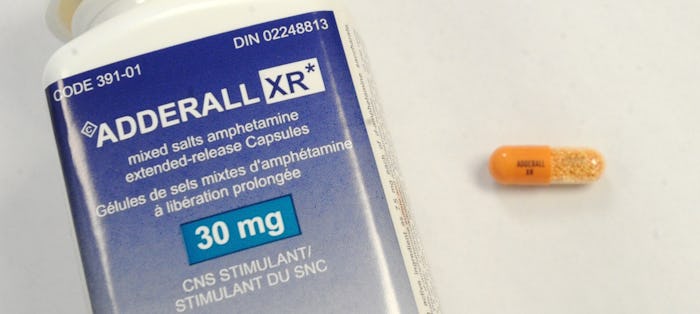News

FDA Confirms There’s An Adderall Shortage In The U.S. Right Now
The FDA is encouraging people to find alternative treatments for ADHD.
On Wednesday, the Food and Drug Administration (FDA) announced a shortage of the immediate release formulation of amphetamine mixed salts, commonly known by its brand name, Adderall, which is used to treat ADHD in children and adults as well as narcolepsy. The shortage is due to a number of factors, which pharmaceutical industry outlets and individuals on the drug have been observing for months.
On social media, some have expressed difficulty obtaining their prescriptions since as early as this spring. “Very kind of “20mg adderall shortage until at least July” to join us all in 2022,” Twitter user @babymaria wrote back on June 4.
“Four days late to learning about an an Adderall shortage, which incidentally reminded me to request a refill,” @anarparikh tweeted on July 13.
According to data from the FDA, resolution of the production issues and backorders ranges depending on manufacturer and specific product/dosage, ranging anywhere from later this month to early 2023.
The problem began this summer, Bloomberg reports, when Teva Pharmaceuticals, the main supplier of the drug in the United States, experienced labor shortage issues on their supply line. The issue created a ripple effect through the industry, rendering three other drug makers — Amneal Pharmaceuticals, Rhodes Pharmaceuticals, and Sandoz — periodically incapable of keeping up with demand, a demand that in the U.S. has increased significantly in the past few years.
Adderall prescriptions for children declined in 2020 and have since stabilized, though below pre-pandemic levels, according to data analyzed by Trilliant Health, while prescriptions for adults aged 22 to 44 only increased, and significantly — more than 7% from 2019 to 2020, and slightly more than 15% increase from 2020 to 2021. (Prescriptions for people over the age of 45 in this period increased as well, but modestly.)
Part of the reason for this uptick, experts say, may have to do with the increased use of telehealth services during the pandemic, and the loosening of restrictions that enabled patients to receive prescriptions for a wider variety of drugs, including controlled substances like amphetamine mixed salts, without an in-person appointment. Cerebral, a telehealth startup, is currently facing a lawsuit from a former staffer alleging that company leadership “directed Cerebral employees [to] find ways to prescribe stimulants to more ADHD patients to increase retention,” Forbes reports.
The fact that Adderall is categorized as a Schedule II controlled substance also may also play a part in the shortage. The Drug Enforcement Administration (DEA) creates quotas (through complicated and therefore frequently misunderstood methods) that establish how much of any given controlled substance can be sold in the U.S. In 2016, Los Angeles Magazine reports, the DEA allowed 50,000 kilograms to be sold. In 2022, however, that number declined to 41,200 kilograms.
The FDA said it’s working with suppliers to track and share information on which medications are available and when others might be expected, which can be found on their regularly updated website. The agency also suggests working with care providers to make a plan in light of these shortages.
“Until supply is restored, there are alternative therapies including the extended-release version of amphetamine mixed salts available to health care professionals and their patients,” the FDA wrote. “Patients should work with their health care professionals to determine their best treatment option.”
This article was originally published on